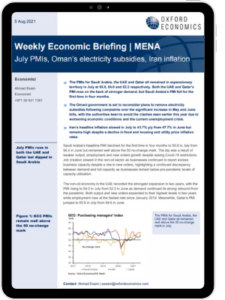MENA | July PMIs, Oman’s electricity subsidies, Iran inflation

The PMIs for Saudi Arabia, the UAE and Qatar all remained in expansionary
territory in July at 55.8, 54.0 and 52.2 respectively. Both the UAE and Qatar’s
PMI rose on the back of stronger demand, but Saudi Arabia’s PMI fell for the
first time in four months.
What you will learn:
- The Omani government is set to reconsider plans to remove electricity
subsidies following complaints over the significant increase in May and June bills, with the authorities keen to avoid the clashes seen earlier this year due to worsening economic conditions and the current unemployment crisis. - Iran’s headline inflation slowed in July to 43.7% y/y from 47.7% in June but remains high despite a decline in food and housing and utility price inflation rates.
- Saudi Arabia’s headline PMI declined for the first time in four months to 55.8 in July from 56.4 in June but remained well above the 50 no-change mark.
Tags:
Related Services

Post
Housing affordability lowest in Greek, Danish, and German cities
House prices across Europe have soared over the past decade, especially in cities. During this time, incomes in Europe have not kept pace with house price hikes on average, squeezing the purchasing power of homebuyers in many European cities.
Find Out More
Post
Parsing US federal job cuts by metro
Cuts to the Federal government workforce, which we estimate to be 200,000 in 2025, will have a modest impact nationally, but more significant implications for the Washington, DC metropolitan economy as it accounts for 17% of all non-military federal jobs in the US.
Find Out More